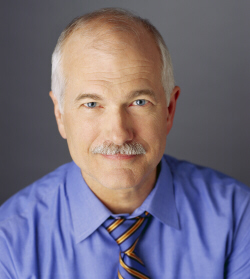Having served as Jack Layton’s senior press secretary for eight-and-a-half years, Karl Bélanger has a plethora of memories about the late NDP leader.
One of the most personal and poignant points to how deeply Layton cared about people. Four summers ago, Bélanger’s mother, Carroll Bourget, died in his hometown, Quebec City. Although he was in the middle of a tour of western Canada, Layton cancelled part of it to fly east to attend the funeral.
“I would not have expected him or asked for him to be there, but he came unannounced to be there, he said, to support a friend. I will always remain appreciative of what he did,” recalls 36-year-old Bélanger, who served as press secretary to former NDP leader Alexa McDonough before taking on the same, more senior role in 2003 when Layton succeeded her.
Layton also attended Bélanger’s wedding to Melissa Hunter, in Gatineau, Que. on Aug. 22, 2009 – two years to the day before the 61-year-old and first-ever NDP Leader of Her Majesty’s Official Opposition succumbed to an undisclosed, new non-prostate cancer (he was diagnosed with prostate cancer in 2010).
Needless to say, Bélanger and his wife didn’t celebrate their second anniversary this year. However, in his touching eulogy, Bélanger celebrated the historic life of the boss – and more importantly – the friend he had lost.
“Jack Layton, at the end of the day, was a guy like anyone else,” he said in French. “He was at ease negotiating with prime ministers as he was talking to homeless people.” “At the end he simply became Jack – a guy who wanted to become close to people, who loved people and wanted to serve people. And the more people knew Jack Layton, the more they were inspired by his message of hope and optimism.”
The tens of thousands of people who lined up to pay their respects before Layton’s Canadian flag-draped coffin in Ottawa and Toronto, who viewed the funeral cortege and who showed up at memorials across the country, are testament to that.
Never before in Canadian history had a sitting federal opposition leader – who had not been prime minister, such as Sir Wilfrid Laurier in 1919 – been accorded a state funeral – and one that was broadcast on all the main English and French television networks. Never before had a federal NDP leader held the position as official opposition leader (who only spent one night at his official residence, Stornoway, in Ottawa), had as large a caucus (103 Members of Parliament, including him) and as many (59) MPs from Quebec.
Layton clearly has a lasting legacy as a politician of a unique stripe, according to Bélanger, who twice ran federally for the NDP in Quebec (in the 1993 federal election and placed last in a race won by the Bloc Québécois’s André Caron in Jonquière, and three years later in a by-election in the Lac-Saint-Jean riding vacated by Bloc leader Lucien Bouchard and placed last again behind the victor, the BQ’s Stéphan Tremblay). “Jack clearly touched a collective nerve to do things differently, by talking in a positive manner about changes that we need – and clearly there was an appetite from the Canadian people for this kind of message.”
Layton will be remembered as “remarkable guy,” in part due to the equally “remarkable” outpouring of affection for him that followed his death, says the Liberals’ federal interim leader, Bob Rae, who had known Layton since the early 1980s.
“He obviously will be remembered as the guy who made the breakthrough happen for the NDP in Quebec in the last election – and that was a remarkable achievement, in large measure related to his image and his presence in Quebec.”
Layton’s other notable achievement, in Rae’s view, was to connect municipal agendas across the country with the federal agenda on such issues as housing and AIDS, and “opened up people’s imaginations” to that too.
Layton’s legacy will also be framed by how he touched Canadians – from the 23-year-old House of Commons security guard who quietly mentioned that he had voted in the last election because, as he gestured toward the casket, “that guy,” to Bélanger, who criss-crossed the country with him.
The press aide and the party leader had a secret code. “There were a lot of things that we didn’t need to say to each other – it was just a look – maybe my eyes would widen, and it became very useful both professionally and personally,” recalls Bélanger, who is being encouraged to run for the federal NDP leadership.
“If he was in a press scrum and it was not going in the right direction, he’d look at me and change course – but not always. We’d later talk about the danger I saw or why I was not pleased with the way it was going.”
However, Layton had “a very sharp mind” and was “always thinking one or two steps ahead of the game,” recalls Bélanger.
That resulted in bold moves, such as negotiating in 2005 with then-prime minister Paul Martin on the federal budget that diverted $4.6 billion in corporate tax concessions toward such NDP policy issues as affordable housing, education and public transit. More recently, following what would be his final news conference on July 25 when he optimistically announced his intention to temporarily step aside as leader, outlined three possible scenarios with Anne McGrath, his chief of staff, about his future. One involved his return; another, his resignation as leader. The third: his death.
“He never wanted to give up, and Jack was the best example of someone who never gives up,” says Bélanger, who helped Layton rehearse the statement he delivered to the media in Toronto in July.
Mildly dyslexic – despite holding a Ph.D. in political science from York University, where he once taught politics and economics, and authoring books on homelessness and public policy – Layton preferred oral briefings rather than reading notes, particularly when he had to answer questions from reporters.
His preference for the spoken rather than written word was manifested in his love of conversation.
Layton would talk to anyone, remembers Bélanger. “It didn’t matter who you were. If you called out ‘Jack,’ he would turn around and come and talk to you.” Not everyone around him was always thrilled about that, especially during the recent federal election campaign.
On three or four occasions, following an NDP rally, someone would approach Layton wanting to talk with him and that person would be invited to join him in his car for a chat. “It would drive Anne McGrath and the RCMP crazy,” recalls Bélanger. Layton also maintained contact with political colleagues that was often personal, says Rae, who first met him when they were members of the NDP and Rae ran and won the provincial party leadership in 1982.
“He was the same Jack Layton for everyone.”
…. Karl Belanger, Senior Press Secretary
“Two or three times he sent me notes about music or about issues that had nothing to do with political struggles at the time,” says Rae, a pianist, who shared an interest in music with piano, guitar and harmonica-playing Layton.
Born in Montreal and raised in the nearby mainly Anglo community of Hudson (where some of his ashes were laid), Layton was always close to his home province, says Bélanger. “He was keen to catch up on the Quebec culture that he had left behind when he moved to Toronto [in 1970]. He was always willing to know more about current cultural trends and new, emerging artists.”
One of those talents – 41-year-old Quebec rocker Martin Deschamps – sang Croire (Believe) from his 2008 album, Le piano et la voix (Piano and Voice) at Layton’s state funeral, billed as a “celebration of life.” Deschamps gave Layton the album and the song was one of the late NDP leader’s favourites on his iPod.
They met five years ago when Layton was in a French-immersion course in Quebec City and bumped into Deschamps at a pub one night. The singer said hi and – not surprisingly – Layton invited him to sit at his table and have a pint of beer. “They spent two hours together,” recalls Bélanger. That was “le bon Jack,” who loved to chat, have a beer – or his favourite, red wine – and get to know people from all walks of life.
To better communicate with his fellow Quebecers, he regularly practised his French, particularly at the beginning of his tenure as leader when he and Bélanger would watch hockey games in French and only converse in the language. Connecting with people is then, perhaps, Layton’s greatest legacy.
A few days before his passing, he sent Bélanger an email thanking him for saying nice things about him in a Maclean’s magazine story.
It read: “Dear Karl, I was touched by your kind comments in the Maclean’s piece. They reminded me of your long-standing loyalty and friendship these past years.” “We have accomplished a lot together, my friend. Much more to do – and don’t ever let them tell you it can’t be done. Much love, Jack.”
The last line one was echoed in Layton’s final, touching letter to Canadians written just two days before his death. It could not have been otherwise.
“Jack was Jack,” says Bélanger.
“He was the same Jack Layton for everyone.”


